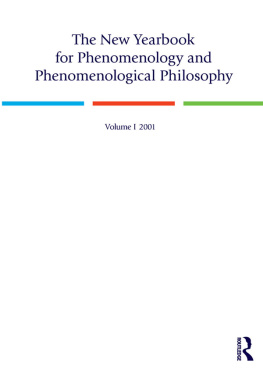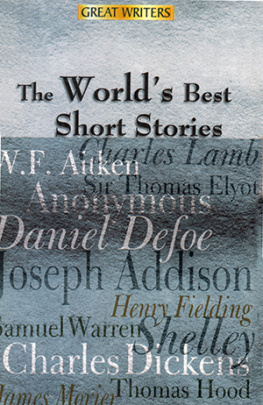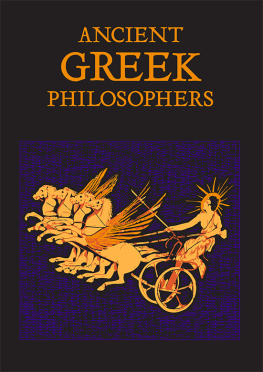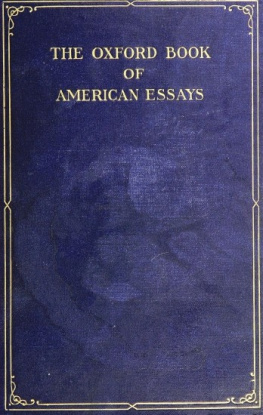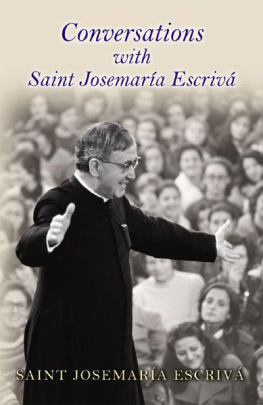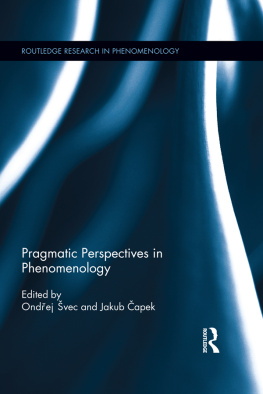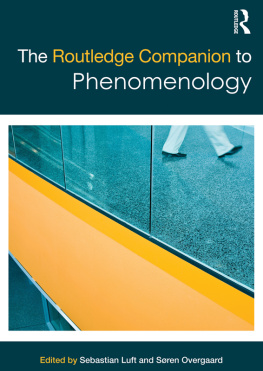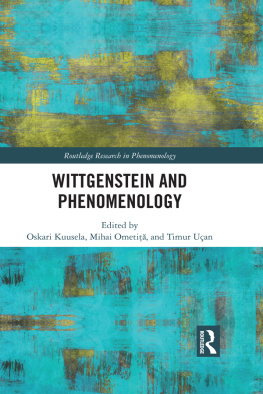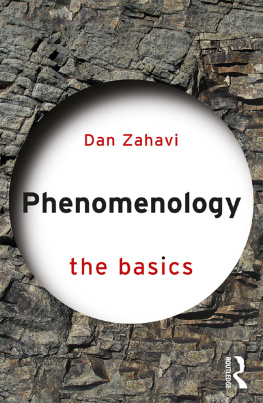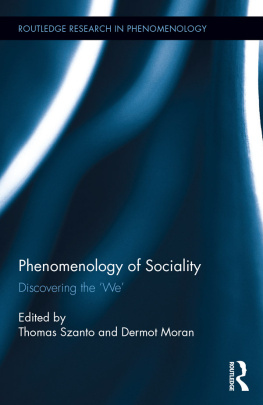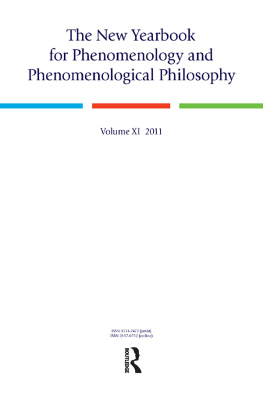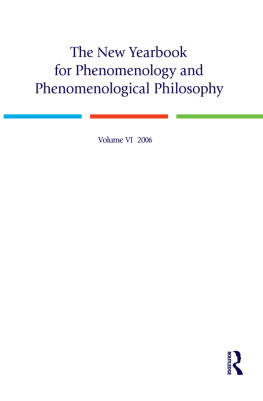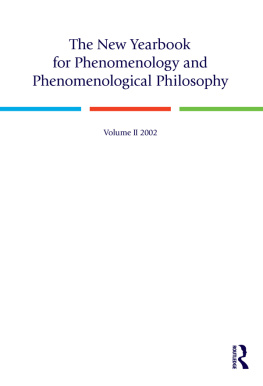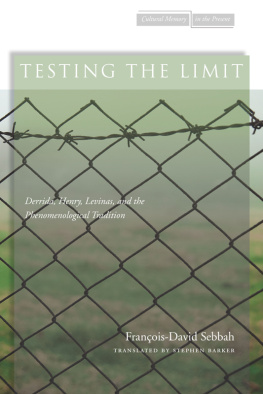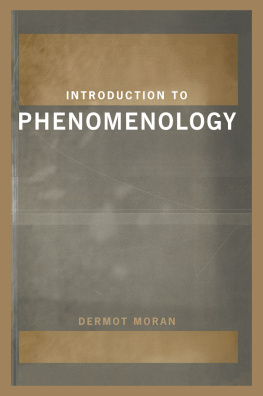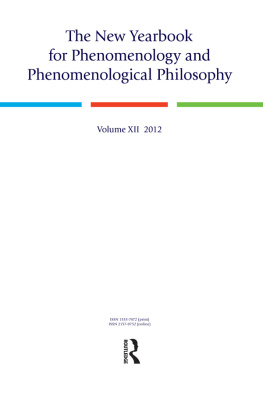The New Yearbook for Phenomenology and Phenomenological Philosophy
General Editors
Burt Hopkins, Seattle University
Steven Crowell, Rice University
Contributing Editors
Marcus Brainard, Munich, Germany
Ronald Bruzina, University of Kentucky
Algis Mickunas, Ohio University
Thomas Seebohm, Bonn , Germany
Thomas Sheehan, Stanford University
Book Review Editor
Sean Leichtle, University of Kentucky
Consulting Editors
Pierre Adler, New School for Social Research
Patrick Burke, Seattle University
Damian Byers, Sydney, Australia
Richard Cobb-Stevens, Boston College
Natalie Depraz, University of Paris IV (Sorbonne)
John Drabinski, Grand Valley State University
John Drummond, Fordham University
R. O. Elveton, Carleton College
Parvis Emad, La Crosse, Wisconsin
Lester Embree, Florida Atlantic University
Kathleen Haney, University of Houston, Downtown
James G. Hart, Indiana University
Patrick Heelan, S.J., Georgetown University
Nam-In Lee, Seoul National University, Korea
James Mensch, St. Francis Xavier University, Canada
Dermot Moran, University College, Dublin, Ireland
Harry Reeder, University of Texas, Arlington
James Risser, Seattle University
Hans Ruin, Sdertorn University College, Sweden
Marylou Sena, Seattle University
Olav K. Wiegand, University of Mainz, Germany
Dan Zahavi, Copenhagen , Denmark
Copyright 2001 by Taylor & Francis
ISSN 1533-7472
ISBN 13: 978-0-9701679-1-0 (pbk)
All rights reserved. No part of the material protected by this copyright may be reproduced or transmitted in any form or by any means, electronic or mechanical, or by any information storage or retrieval system, without permission in writing from the Publisher.
Aim and Scope: The New Yearbook for Phenomenology and Phenomenological Philosophy will provide an annual international forum for phenomenology and phenomenological philosophy in the spirit of Edmund Husserl's groundbreaking work and the extension thereof in the phenomenological tradition broadly conceived. The editors welcome the submission of manuscripts containing original research in phenomenology and phenomenological philosophy, contributions to contemporary issues and controversies, critical and interpretative studies of major phenomenological figures, investigations on the relation of phenomenology and phenomenological philosophy to the natural and human sciences, and historical studies and documents pertaining to phenomenology and phenomenological philosophy. Translations of classic and contemporary phenomenological texts are also welcome, though translators should consult with the editors in advance.
First published 2001 by Noesis Press
Published 2015 by Routledge
2 Park Square, Milton Park, Abingdon, Oxon OX14 4RN
711 Third Avenue, New York, NY 10017, USA
Routledge is an imprint of the Taylor & Francis Group, an informa business
Contents
| I Essays |
| JAMES MENSCH |
| BURT C. HOPKINS |
| MARCUS BRAINARD |
| ALGIS MICKUNAS |
| THOMAS SHEEHAN |
| R. O. ELVETON |
| OLAV K. WIEGAND |
| Appraisals of Eugen Fink's Phenomenology |
| STEVEN GALT CROWELL |
| JAMES G. HART |
| SEAN LEICHTLE |
| II. Texts and Documents |
| EDMUND HUSSERL |
| ADELGUNDIS JAEGERSCHMID, O.S.B. |
| OSKAR BECKER |
| JACOB KLEIN |
| III. Discussions |
| RONALD BRUZINA |
| BURT C. HOPKINS |
James Mensch
Saint Francis Xavier University
Discussions of language are distinguished by a lack of clear boundaries. This is because language claims to represent the world. We take its signs as referring to items in the world. How do they accomplish this reference? To answer this question, it seems that we cannot limit our inquiry to the signs themselves. The question of how they achieve this reference merges with the question of how we come into contact with the world. How do we grasp the objects referred to by linguistic signs? What is the role of language in this grasp? Are linguistic signs shaped by the world, drawing their meanings from its different objects, or do such signs shape these meanings? Are we to take language as an openness to what is beyond itselfthat is, the world? An alternate view is that we are sealed within language. We cannot escape its determination of meaning.
These issues cannot be decided without examining our apprehension of the world. This, however, raises a fresh set of questions. How do we intuit its objects? How is it possible for intuition to confirm our assertions independently ? If we conceive of language as determining intuition, such inquiries are, of course, fruitless. Sealed off from the presence of what is beyond itself, language can only be thought of as a self-defining, self-referential system of signs. If this is the case, the focus on intuitive presence can only lead us astray. It prevents us from confronting the real task: to examine language in terms of itself, that is, in terms of how it determines the meanings of its signs. Once again, the question of language expands. At issue here is what we mean by presence. The position that appeals to intuition understands presence as ultimately determinative. It takes the presence of the worldin particular, the presence of meanings embodied in objectsas responsible for the meanings words have. This is why a word can refer through its meaning to an object. For the opposing position, the notion that presence is ultimately determinative is held to be a "metaphysical prejudice." According to Derrida, to escape this prejudice, we must "deconstruct" it. We must focus on "the tensions, the contradictions, Once we have abandoned this prejudice, we can see the system of linguistic signs for what it is, a self-defining system of signs referring to signs. The ability of a sign to refer does not point to some non-linguistic, confirming presence. It is inherent in the sign itself. Were we to eliminate the notion of a confirming presence, we would see that the reference of a sign terminates in another sign, one that passes on this reference to yet another sign, and so on.
With this we come to yet another expansion of the question. Having extended our inquiry to include the question of presence, we find ourselves confronted by its temporal sense. Thus, the present of presence signifies nowness. The movement of time makes things present by making them now. What is the relation of this making present to the world? Is the movement of time ultimately to be traced to that of the world? In such a view, we take the successive nows that constitute times movement as a function of the world. Their origin is the successive impressions we receive from its objects. We thus come to affirm that nowness is the worlds presence to us in the impressions it leaves. Augustine gives the classic expression of this position when he writes: It is in you, O my mind, that I measure time.... What I measure is the impress produced in you by the things as they pass and [the impressions] abiding in you when they have passed. The impress is registered as the present now. We register the abiding impression left in the mind as the remembered now. Yet if we break the tie between presence and the world, we have to say that the impress is the result of our own activity. The impression that results in the now comes, in other words, not from the world but from ourselves. It is a result of our affecting ourselves. In Derridas phrase, its origin is the auto-affection of consciousness.

